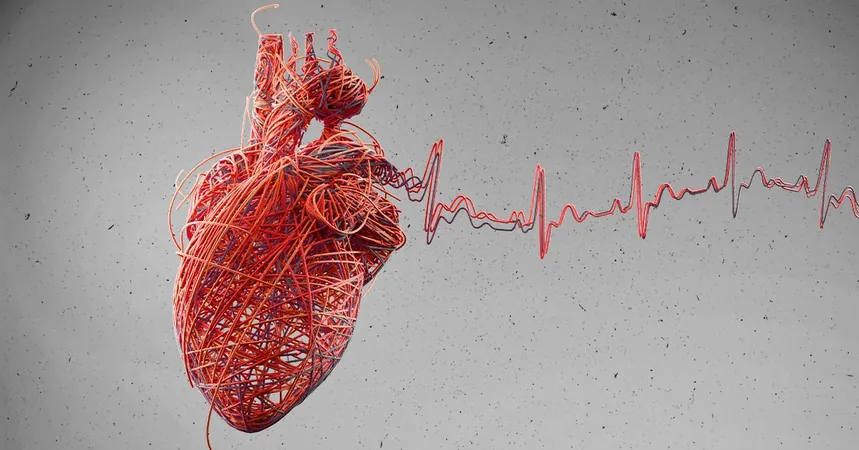
Could Bacteria in Your Mouth Be Causing Heart Attacks?
2025-09-13
Author: Daniel
A Deadly Link: Bacteria and Heart Disease
In 2022, around 19.8 million people lost their lives to heart disease globally, with a staggering 85% of these fatalities caused by strokes and heart attacks. This startling statistic has put a spotlight on the underlying factors contributing to heart disease, including the role of bacterial infections.
Emerging Research Reveals Alarming Connections
New groundbreaking research has identified specific bacteria, particularly those found in the mouth and throat, as potential triggers for heart attacks. Historically, studies have linked bacterial infections to the risk of arterial plaque buildup, a precursor to heart disease.
Dr. Pekka J. Karhunen, a prominent researcher from Tampere University in Finland, emphasizes that while the connection between infections and heart disease was largely dismissed two decades ago, recent advancements in microbiological techniques have reignited this interest.
The Bacterial Culprit: Streptococci
Karhunen's study, published in the Journal of the American Heart Association, analyzed coronary plaque samples from 121 individuals who died from sudden cardiac events and 96 patients who underwent plaque removal surgery. The findings revealed that the viridans group of Streptococci bacteria, commonly found in dental plaque, was prevalent in the coronary samples.
These bacteria, while usually harmless and part of the oral ecosystem, may act as agents of inflammation when they invade arterial plaque.
How Bacteria Trigger Heart Attacks
Dr. Karhunen elaborates that these oral bacteria can contribute to a biofilm that, when activated, can lead to the breakdown of plaque in arteries. This process can trigger inflammation, risking the formation of clots that cause heart attacks. Addressing the potential for developing a vaccine to prevent this bacterial-induced thrombus formation could be a game-changer in heart disease prevention.
Expert Opinions: The Bigger Picture
Cardiologist Dr. Sergiu Darabant highlighted that this research adds another layer to understanding how inflammation drives heart disease. Identifying transient bacterial infections as triggers could open new avenues for targeted therapies.
Meanwhile, Dr. Yu-Ming Ni, while intrigued, cautioned that such studies have limitations, suggesting a complex interplay rather than a direct causation.
Maintaining Oral Health: A Simple Preventative Measure
As worry over bacterial infections rises, experts like Dr. Brett A. Sealove reassure the public that the strep viridans bacteria are typically benign. However, their movement into the bloodstream can lead to conditions like endocarditis, a serious heart infection.
Dental health emerges as critical; maintaining good oral hygiene could mitigate the risk of bacterial infections that may contribute to heart issues. Dr. Sealove emphasizes the connection between oral and systemic health, suggesting that by caring for one's mouth, individuals can also protect their heart health.
Looking Ahead: What This Means for Heart Disease Prevention
As research into the connection between bacterial infections and heart attacks continues, the potential for new treatment strategies looks promising. The findings not only shed light on the hidden dangers lurking in our mouths but also underscore the importance of preventive care in the fight against heart disease.





 Brasil (PT)
Brasil (PT)
 Canada (EN)
Canada (EN)
 Chile (ES)
Chile (ES)
 Česko (CS)
Česko (CS)
 대한민국 (KO)
대한민국 (KO)
 España (ES)
España (ES)
 France (FR)
France (FR)
 Hong Kong (EN)
Hong Kong (EN)
 Italia (IT)
Italia (IT)
 日本 (JA)
日本 (JA)
 Magyarország (HU)
Magyarország (HU)
 Norge (NO)
Norge (NO)
 Polska (PL)
Polska (PL)
 Schweiz (DE)
Schweiz (DE)
 Singapore (EN)
Singapore (EN)
 Sverige (SV)
Sverige (SV)
 Suomi (FI)
Suomi (FI)
 Türkiye (TR)
Türkiye (TR)
 الإمارات العربية المتحدة (AR)
الإمارات العربية المتحدة (AR)